Important State of the Union Addresses in History
Click HERE for our latest articles about the State of the Union Address
Related Links
● Complete text archive of past State of the Union addresses.
● Lewis Gould: Abolish the State of the Union Address
● 2 Whoppers Made by President Bush in Past State of the Union Addresses
● What Do Presidents Say in State of the Union Addresses When the News Is Gloomy?
The Constitution requires that the president of the United States "shall from time to time give to the Congress information of the State of the Union and recommend to their Consideration such Measures as he shall judge necessary and expedient." The first presidents delivered their address in person. Then Thomas Jefferson abandoned the practice. For a century presidents delivered their annual messages in written form. Woodrow Wilson revived the practice of delivering the message in person, though some presidents on occasion have filed written messages in some years, usually at the end of their last year in office when it would be somewhat awkward for the outgoing president to command the nation's attention as a new president prepared to take office. In the modern era presidents have begun their presidencies with a message to Congress. Strictly speaking, these are not "State of the Union" addresses. But informally they are often described that way.

The first memorable State of the Union address--then known simply as the annual message to Congress--was written by James Monroe in 1823 when he announced what became known as the Monroe Doctrine.
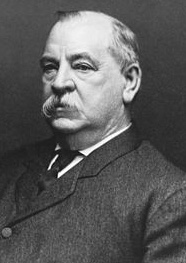
Grover Cleveland, as he was leaving office after his defeat for reelection in 1888, sounded the most radical note of any president in history. In his final message to Congress he denounced American corporations and exclaimed that they were "fast becoming the people's masters." At the end of his second term he denounced the trusts, assailing them as "palpable evils."
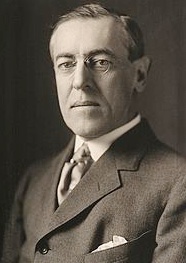
Woodrow Wilson revived the practice, abandoned by Thomas Jefferson, of delivering the State of the Union address in person. Teddy Roosevelt is said to have complained that he wished he'd thought of it. (Lewis Gould has noted in a communication with HNN that Wilson actually"broke the precedent against presidents sending in written messages to Congress when he came to deliver his address opening the special session dealing with what became the Underwood Tariff on April 8, 1913. By the time he did the annual message in December 1913 the novelty of the moment had long since passed.")
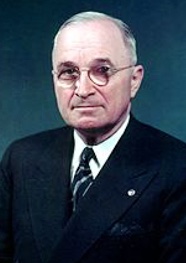
Harry Truman's 1947 State of the Union address was televised--a first. He wore semiformal morning dress with a turned-up collar. The New York Times noted that the picture was clear enough to see him smile.
The Republicans had taken over Congress the previous November. Truman opened with a quip: "It looks like a good many of you have moved over to the left since I was last here." Republicans wanted to repeal the wartime excise tax. Truman, worried about the deficit, opposed the move. He said that he wanted to keep America strong so as not to "invite" another attack.
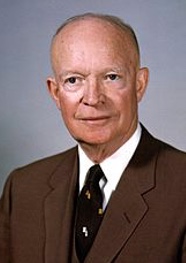
During his first term Dwight Eisenhower used each of his State of the Union addresses to draw attention to the "captive peoples" trapped behind the Iron Curtain.
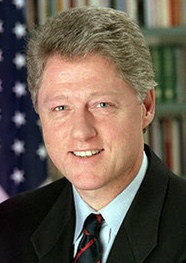
Perhaps the most anticipated state of the Union address was Bill Clinton's in 1998. Some wondered whether he would resign before he had the chance to deliver it. Just days before, on January 18, Matt Drudge reported that Newsweek had killed a story about a White House intern. It was the beginning of the Monica Lewinsky scandal. On January 21 the Washington Post led with a front-page story headlined: "Clinton Accused of Urging Aide to Lie/Starr Probes Whether President Told Woman to Deny Alleged Affair to Jones's Lawyer." On January 25 Sam Donaldson commented on ABC's "This Week": "if he's not telling the truth, I think his presidency is numbered in days." On Tuesday January 27 President Clinton told the country: "Ladies and gentlemen, the state of our Union is strong." It was during this speech that Clinton put forward his proposal to Save Social Security First by using the surplus to pay off the national debt. The president's poll numbers rose to the highest level of his presidency.
Past State of the Union Addresses
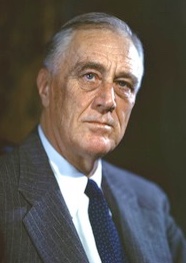
Franklin Roosevelt, State of the Union Address, 1941:
In the future days which we seek to make secure, we look forward to a world founded upon four essential human freedoms.
The first is freedom of speech and expression --everywhere in the world. The second is freedom of every person to worship God in his own way-- everywhere in the world. The third is freedom from want, which, translated into world terms, means economic understandings which will secure to every nation a healthy peacetime life for its inhabitants--everywhere in the world. The fourth is freedom from fear, which, translated into world terms, means a world-wide reduction of armaments to such a point and in such a thorough fashion that no nation will be in a position to commit an act of physical aggression against any neighbor --anywhere in the wold.
That is no vision of a distant millennium. It is a definite basis for a kind of world attainable in our own time and generation. That kind of world is the very antithesis of the so-called"new order" of tyranny which the dictators seek to create with the crash of a bomb. To that new order we oppose the greater conception --the moral order. A good society is able to face schemes of world domination and foreign revolutions alike without fear. Since the beginning of our American history we have been engaged in change, in a perpetual, peaceful revolution, a revolution which goes on steadily, quietly, adjusting itself to changing conditions without the concentration camp or the quicklime in the ditch. The world order which we seek is the cooperation of free countries, working together in a friendly, civilized society.

Harry Truman, State of the Union Address, 1948:
Our first goal is to secure fully the essential human rights of our citizens.
The United States has always had a deep concern for human rights. Religious freedom, free speech, and freedom of thought are cherished realities in our land. Any denial of human rights is a denial of the basic beliefs of democracy and of our regard for the worth of each individual.
Today, however, some of our citizens are still denied equal opportunity for education, for jobs and economic advancement, and for the expression of their views at the polls. Most serious of all, some are denied equal protection under laws. Whether discrimination is based on race, or creed, or color, or land of origin, it is utterly contrary to American ideals of democracy.
The recent report of the President's Committee on Civil Rights points the way to corrective action by the Federal Government and by State and local governments. Because of the need for effective Federal action, I shall send a special message to the Congress on this important subject....
Our second goal is to protect and develop our human resources.
The safeguarding of the rights of our citizens must be accompanied by an equal regard for their opportunities for development and their protection from economic insecurity. In this Nation the ideals of freedom and equality can be given specific meaning in terms of health, education, social security, and housing.
Over the past 12 years we have erected a sound framework of social security legislation. Many millions of our citizens are now protected against the loss of income which can come with unemployment, old age, or the death of wage earners. Yet our system has gaps and inconsistencies; it is only half finished.
We should now extend unemployment compensation, old age benefits, and survivors' benefits to millions who are not now protected. We should also raise the level of benefits.
The greatest gap in our social security structure is the lack of adequate provision for the Nation's health. We are rightly proud of the high standards of medical care we know how to provide in the United States. The fact is, however, that most of our people cannot afford to pay for the care they need.
I have often and strongly urged that this condition demands a national health program. The heart of the program must be a national system of payment for medical care based on well-tried insurance principles. This great Nation cannot afford to allow its citizens to suffer needlessly from the lack of proper medical care.
Our ultimate aim must be a comprehensive insurance system to protect all our people equally against insecurity and ill health.
Lyndon Johnson, State of the Union Address, 1965 :
World affairs will continue to call upon our energy and our courage.
But today we can turn increased attention to the character of American life.
We are in the midst of the greatest upward surge of economic well-being in the history of any nation.
Our flourishing progress has been marked by price stability that is unequalled in the world. Our balance of payments deficit has declined and the soundness of our dollar is unquestioned. I pledge to keep it that way and I urge business and labor to cooperate to that end.
We worked for two centuries to climb this peak of prosperity. But we are only at the beginning of the road to the Great Society. Ahead now is a summit where freedom from the wants of the body can help fulfill the needs of the spirit.
We built this Nation to serve its people.
We want to grow and build and create, but we want progress to be the servant and not the master of man.
We do not intend to live in the midst of abundance, isolated from neighbors and nature, confined by blighted cities and bleak suburbs, stunted by a poverty of learning and an emptiness of leisure.
The Great Society asks not how much, but how good; not only how to create wealth but how to use it; not only how fast we are going, but where we are headed.
It proposes as the first test for a nation: the quality of its people.
This kind of society will not flower spontaneously from swelling riches and surging power.
It will not be the gift of government or the creation of presidents.
It will require of every American, for many generations, both faith in the destination and the fortitude to make the journey.
And like freedom itself, it will always be challenge and not fulfillment.
And tonight we accept that challenge.
I propose that we begin a program in education to ensure every American child the fullest development of his mind and skills.
I propose that we begin a massive attack on crippling and killing diseases.
I propose that we launch a national effort to make the American city a better and a more stimulating place to live. I propose that we increase the beauty of America and end the poisoning of our rivers and the air that we breathe.
I propose that we carry out a new program to develop regions of our country that are now suffering from distress and depression.
I propose that we make new efforts to control and prevent crime and delinquency.
I propose that we eliminate every remaining obstacle to the right and the opportunity to vote.
I propose that we honor and support the achievements of thought and the creations of art.
I propose that we make an all-out campaign against waste and inefficiency.